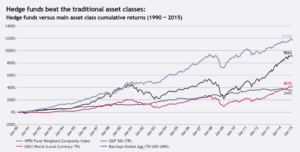Market anomalies - how do "dumb" and "smart" money affect price movements?
How often do we see market anomalies? The market efficiency hypothesis is one of the favorite research topics of many economists. Simplifying the academic concept, market efficiency tells us that the price of financial instruments fully reflects the information available on the stock exchange.
I think that one does not have to look far for examples of various kinds of market anomalies to deny the efficiency hypothesis to some extent. It is enough to reach for overvalued or undervalued stocks to understand what the title anomaly is.
In today's post I want to tell you a bit about the share of "smart" and "dumb" (dumb) money in market movements.
Who is who?
Let's start with a simple definition of the sides of the market that are hidden under the names smart and dumb. Stupid money is primarily the cash flow that enters the market from mutual funds, while smart money is the action of hedge funds.
READ ALSO: Traders' sentiment - what is it and how to use it in trading?
Why is it like that? I will explain later in the text. At this point, I would like to focus on one more thing, which is the effect. The effect of these market forces is:
- deviation of prices from fundamentals
- bringing prices back into balance
There is a very extensive documentation (based on equity markets, but the conclusions of this study can easily be translated into every market where smart / dumb operate) of stock market anomalies, which were developed by, for example, McLean, Pontiff or Stambaugh. Each of these readings imposes one consistent conclusion on us, which reads as follows: price pressure from stupid money typically causes prices to deviate from fundamental values, while (e.g. through arbitrage, long / short) smart money causes price to revert to fundamental value.
Why are mutual funds dumb? - the effect of the pursuit of results
Many scientific works, which I do not want to quote (and the list is long!), In order not to bore the reader, showed that the flows of investment funds, or simply put funds for investment, disturb the allocation (placing) of capital on the market. Consider the example of investing in companies. Sirri and Tufano indicated as early as 1998 that retail investors have a strong tendency to chase performance. As a result, they direct their capital to the funds that show the best rates of return Interestingly, they do not withdraw money from those TFIs with poor returns.
When a fund that is performing very well on a given stock receives new investment funds from retail investors, it is usually forced to increase its exposure to existing stock packages. It naturally comes to this self-sabotage in the form of a subsequent reversal of rates of return. Likewise, it is the case with funds that are showing poor returns and are forced to liquidate some of their positions to satisfy those who wish to withdraw capital.
Smart money - the hunt for revaluation
Interestingly smart money can be defined not only as hedge funds, but also as managers of these funds and investors who operate similarly (with similar strategies) to FH. The very operation of these funds, not very popular in Poland, makes one think that they are a kind of "anomaly neutralizer" and bring the price back into balance. Sometimes (rarely, but it does happen) the price detaches from the foundations for a longer period of time due to the fact that the capital allocated to arbitrage strategies may be small in its initial scale (in relation to TFI involvement). Then, in the first hedge periods, funds are not able to completely erase, for example, overvaluation, but only mitigate it.
What is very interesting (as proved by Boehmer, Jonses, Zhang) short transactions are usually more conscious. So, necessarily corrective effect (market falling into a correction) usually occurs on overvalued stocks. Therefore, a ready-made strategy can be drawn from it, which consists in selecting (e.g. on a monthly basis) the most overvalued financial instruments and setting short orders. Of course, the whole point of this strategy is how we will measure mispricing. While equities can use book value indices, etc., on the rest of the instruments it may be a bit more difficult to determine "true value".
Applications to trade
The first conclusion that could be drawn is not to trade inflated assets in line with their trend. However, I do not want to suggest here that every time on an uptrend, we should hunt for declines and use a contrarian approach to resistance at all costs. The second, and at the same time the most obvious, makes one think about not succumbing to the recommendations of investment banks, whose "recommended trading ideas" can serve as an artificial redirection of traffic to assets with an already overvalued price.
In all the madness of smart money trading, it is worth considering one more factor, which is liquidity. Soon I will devote a separate article to catching liquidity in the market on the example of SMC. However, I would only like to mention here that hedge funds, taking into account their operating model (arbitrage or long / short), require confirmation in liquidity, i.e. the market on which it is easy to place an order and close it. Therefore, some forex traders use momentum and volume to trade. However, there is nothing to prevent checking the liquidity directly from the candles.






















![Forex Club – Tax 9 – Settle tax on a foreign broker [Download the Application] Forex Club - Tax 9](https://forexclub.pl/wp-content/uploads/2024/02/Forex-Club-Podatek-9-184x120.jpg?v=1709046278)
![Trading View platform – solutions tailored to the needs of traders [Review] trading view review](https://forexclub.pl/wp-content/uploads/2024/03/trading-view-recenzja-184x120.jpg?v=1709558918)
![How to connect your FP Markets account to the Trading View platform [Guide] fp markets trading view](https://forexclub.pl/wp-content/uploads/2024/02/fp-markets-trading-view-184x120.jpg?v=1708677291)
![How to invest in ChatGPT and AI? Stocks and ETFs [Guide] how to invest in chatgpt and artificial intelligence](https://forexclub.pl/wp-content/uploads/2023/02/jak-inwestowac-w-chatgpt-i-sztuczna-inteligencje-184x120.jpg?v=1676364263)


![WeWork – the anatomy of the collapse of a company valued at $47 billion [WeWork, part II] wework bankruptcy story](https://forexclub.pl/wp-content/uploads/2024/04/wework-bankructwo-historia-184x120.jpg?v=1711729561)
![Adam Neumann – the man who screwed up Softbank [WeWork, part AND] adam neumann wework](https://forexclub.pl/wp-content/uploads/2024/04/adam-neumann-wework-184x120.jpg?v=1711728724)





![How to transfer shares to another brokerage office [Procedure description] how to transfer shares to another brokerage house](https://forexclub.pl/wp-content/uploads/2024/03/jak-przeniesc-akcje-do-innego-biura-maklerskiego-184x120.jpg?v=1709556924)

![The most common mistakes of a beginner trader - Mr Yogi [VIDEO] Scalping - The most common mistakes of a beginner trader - VIDEO](https://forexclub.pl/wp-content/uploads/2024/03/Scalping-Najczestsze-bledy-poczatkujacego-tradera-VIDEO-184x120.jpg?v=1711601376)
![Learning patience: No position is also a position - Mr Yogi [VIDEO] Scalping - Learning patience - No position is also a position - VIDEO](https://forexclub.pl/wp-content/uploads/2024/03/Scalping-Nauka-cierpliwosci-Brak-pozycji-to-tez-pozycja-VIDEO-184x120.jpg?v=1710999249)
![When to exit a position and how to minimize losses - Mr Yogi [VIDEO] Scalping - When to exit a position and how to minimize losses - VIDEO](https://forexclub.pl/wp-content/uploads/2024/03/Scalping-Kiedy-wyjsc-z-pozycji-i-jak-minimalizowac-straty-VIDEO-184x120.jpg?v=1710336731)




![Win the book "Supply and Demand Strategy in Trading" [Competition] demand and supply strategy competition](https://forexclub.pl/wp-content/uploads/2023/10/strategia-popytu-i-podazy-konkurs-300x200.jpg?v=1696932181)

![Mieczysław Siudek - a bit different about trading [Interview] Mieczysław Siudek - a bit different about trading - interview](https://forexclub.pl/wp-content/uploads/2022/10/Mieczyslaw-Siudek-o-tradingu-troche-inaczej-wywiad-300x200.jpg?v=1666953118)











